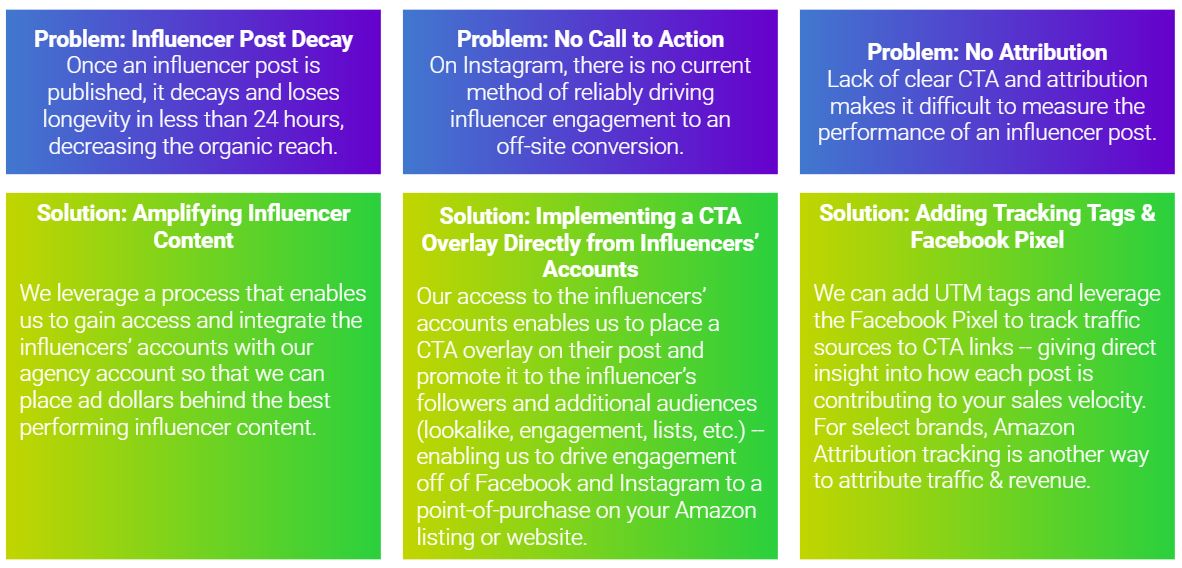Why Brands Should Boost Influencer Marketing With Ad Spend


In recent years, influencer marketing has evolved from an ancillary marketing tactic to a multi-billion dollar industry. Today’s digitally-native consumers rely on content from trusted sources — like influencers! — to make purchasing decisions.
According to Emarketer, up to 48% of marketers use influencer marketing, with an average of 10% of total media budget going towards the tactic. By 2020, influencer marketing spend will increase to 5 to 7 billion dollars (MediaKix).
But what is influencer marketing?
Influencer marketing refers to the practice of partnering with people who hold influence over your potential customers (influencers!) and then amplifying their content by putting ad spend behind it.
These influencers a loyal following on social media through online content creation. Marketers can partner with influencers to raise awareness and drive sales for their products by posting on social media.
Influencers post across a variety of platforms, including:
And these social media users fall into several tiers:
Many brands find the best results from working with micro-influencers with niche audiences. Partnering with micro-influencers allows you to tap into pre-existing communities, plus it costs less than working with macro-influencers.
Micro-influencers also see higher engagement rates than macro-influencers.

The typical influencer marketing process can have limitations and roadblock for brands. The process usually includes:
This process can be time-consuming, and it can be hard to source the right influencers for your brand and niche. You also need to ensure that each post is on-brand and effectively communicates your value prop.
This strategy also has no amplification, which means you don’t have any way to expand your reach beyond the organic post. Finally, it’s hard to measure success beyond impressions and engagement — but you need to be able to quantify your results.
“Historically, influencer marketing has been reserved for Fortune 500 companies and celebrity influencers, but the tide is rapidly turning towards wider accessibility. Large-scale influencers are modern-day equivalent to TV buys where audience and success metrics are implied, not precisely measured. Most influencer marketing still lives within companies’ branding departments and aren’t held to direct-response goals.”
– Sarah Sanchez, Sr. Manager, Social Strategy at Tinuiti

Tinuiti does influencer marketing a bit differently. We view it as a full-funnel tactic, which means that posts can drive metrics at every stage of the customer journey:
Tinuiti starts with you “why”: What do you want to accomplish with your influencer marketing campaign? This might include impressions for awareness or sales for ROI.
Next, we’ll help you decide where you want to drive your traffic, such as Amazon or your website. You’ll also need to define what audience you’d like to target and which type of content you want the influencers to create (video, posts, stories, etc)
Once you know your goals, the micro-influencer discovery process starts. Tinuiti has vetted influencer partners and platforms to recommend the best partners to our clients. This minimizes the amount of time you have to spend researching influencers but still lets you achieve micro-influencer economies of scale.
This process gives you more control over your creative and lets you reach a hyper-targeted audience for the lowest cost.
Next, the influencers post, generating impressions and engagement. Tinuiti evaluates engagement through comments, likes, and impressions.
We also evaluate the quality of the content and how well it represents the product. This helps ensure alignment between your brand and the influencer content.
Finally, we amplify influencer content. Amplification drives more engagement — and turns engagement into revenue.
Here’s how:
Often, once an influencer post is published, it loses organic impact in less than 24 hours. By amplifying influencer content, we can integrate the influencer’s account with our agency account so that we can place ad dollars behind the best-performing influencer content.
On Instagram, it’s currently difficult to tie influencer engagement to an off-site conversion. By implementing a CTA overlay directly from an influencer’s account, we can promote it to the influencer’s followers and additional audiences, like lookalike, engagement, and lists. This enables us to drive engagement off of Facebook and Instagram to a point-of-purchase, like your Amazon listing or website.
Finally, the lack of clear CTA and attribution makes it difficult to measure the performance of an influencer post. We can add UTM tags and Facebook Pixels to track traffic sources to the CTA links. This gives us direct insight into how each post contributes to your sales.

Here are some key takeaways to keep in mind:
